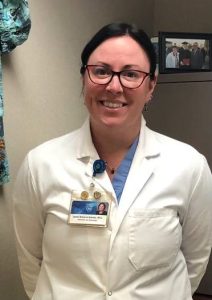The number of women who develop cervical cancer has been greatly reduced due to screening with Pap smears, but other gynecologic cancers such as ovarian and endometrial cancer, remain difficult to detect at an early stage, when treatments are more effective.
 This year alone, over 65,000 new cases of endometrial cancer will be diagnosed in the U.S. Sadly, for many women, the diagnosis will come too late, when the cancer is already advanced. Jamie Bakkum-Gamez, M.D., a gynecologic oncologist from the Mayo Clinic, hopes to turn the tables on this potentially devastating disease by developing the first early detection diagnostic test for endometrial cancer.
This year alone, over 65,000 new cases of endometrial cancer will be diagnosed in the U.S. Sadly, for many women, the diagnosis will come too late, when the cancer is already advanced. Jamie Bakkum-Gamez, M.D., a gynecologic oncologist from the Mayo Clinic, hopes to turn the tables on this potentially devastating disease by developing the first early detection diagnostic test for endometrial cancer.
Bakkum-Gamez and her team are working to create a simple test kit that women could use in the privacy of their own home to screen for endometrial, ovarian and cervical cancer all at once. Women would use the kit to collect a sample of vaginal fluid and then send it to a lab for analysis.
“The pandemic has underscored the importance of remote patient care and telehealth as tools that can help people stay as healthy as possible,” Bakkum-Gamez said. “Tests like the one we are developing are another important component of this because they can be done at home without risking exposure to COVID-19 by going into a public space like a doctor’s office.”
Searching for cancer’s telltale signs
The team’s test is designed to detect the epigenetic DNA modification known as methylation, which changes the way a gene is expressed without changing the gene’s DNA sequence. When looked at collectively, these modifications across all DNA within the cells of each unique tissue in the body are referred to as the methylome. In a pilot study, the researchers showed markers based on DNA methylation unique to endometrial cancer could be detected in the vaginal fluid of women with endometrial cancer but are not present in vaginal fluid of women without cancer.
Thanks to V Foundation support, Bakkum-Gamez then formed a collaboration with the team at Mayo Clinic that developed Cologuard, an at-home test used for colon cancer screening. Cologuard makes it simple to collect a stool sample at home and then ship it to a lab, where it is analyzed for colon cancer biomarkers.
“With the same technology used to develop Cologuard, we performed an extremely thorough sequencing-based search through the DNA methylome to find biomarkers that were associated with endometrial cancers, as well as ovarian and cervical cancers,” said Bakkum-Gamez. “We are the first group to define the methylome for endometrial cancers.”
Bakkum-Gamez and her team identified unique markers for the most common form of endometrial cancer, which tends to be the easiest to treat, as well as forms of endometrial cancer that are more aggressive. To see whether these biomarkers could be used to identify cancer using vaginal fluid, they conducted a clinical trial involving 200 women, half of whom had endometrial cancer and half of whom had benign gynecologic conditions. Participants collected their own vaginal fluid by inserting and later removing a regular over-the-counter tampon.
“Using a panel of 29 methylation markers, we were able to identify a very high proportion of the women with endometrial cancer just based on vaginal fluid collection and testing,” said Bakkum-Gamez. “Because of these promising findings, we are planning a larger study with a more diverse group of participants.”
Beyond endometrial cancer
The researchers have also identified unique methylation markers for other gynecological cancers. These markers will also be tested in vaginal fluid. “Because there may be different markers for different types of cancers in the vaginal fluid, we wanted to make sure that we weren’t missing an opportunity to detect other cancers,” Bakkum-Gamez said. These markers eventually could be incorporated into an at-home test that screens for endometrial, cervical and ovarian cancers.
If the larger clinical studies continue to be successful, Bakkum-Gamez estimates an at-home screening test could potentially be available in the next five years.
An easy-to-use, at-home gynecologic cancer test kit would not only be useful to patients—it would also bring peace of mind. With the promising capability to detect gynecological cancers earlier than ever before, Bakkum-Gamez hopes women will soon be able to take comfort in knowing that if cancer does strike, it can be caught in time for lifesaving treatment.




